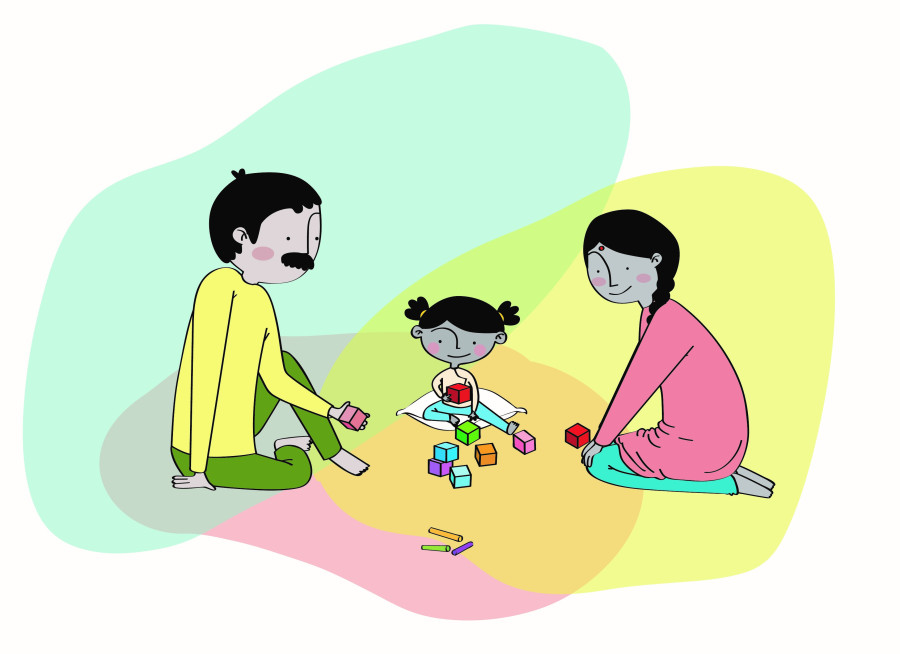Columns
The stress of entrance exams
The entrance examination is a barrier to young children's growth and development.
Dipu Shakya & Kenji Kitamura
It is stressful for parents in Nepal, especially those who have young children who will be starting grade one from the new academic session in Baisakh. The first step to getting their young children enrolled—especially in urban areas like Kathmandu where there are many school choices—is filling out the school application form. In addition to this, parents also have a massive task of getting their five-to six-year-olds ready for various entrance examinations. Yes, you heard that right: This is all for enrolment in grade one.
As per clause 3.1 of the Act Relating to Compulsory and Free Education 2018, all citizens in Nepal have a right to equitable access to quality education, free from any discrimination. But the reality is that schools in high demand have limited seats, and cannot accept all the thousands of applications they receive. Consequently, the "entrance exam" has come into practice in Nepal, especially at many institutional (private) schools and some popular community schools.
What the test entails
As per the act, schools can assess children based on the minimum standards for grade one, and allow enrolment of those children who meet these standards. In this case, this refers to the skills children are expected to develop in pre-school and before grade one. However, according to the “entrance exam preparation” books available in the market, many schools appear to be conducting tests beyond the grade level. As per the Early Learning Development Standards and pre-primary curriculum issued by the government, learning at the pre-primary level should be focused on conceptual understanding and holistic development of the children. At the same time, academic content is limited to pre-literacy (recognition of simple letters/words) and pre-numeracy (recognition up to number nine).
Contrary to this, many grade-one entrance exams include paper and pencil tests conducted based on the assumption that young children can write complex words or even simple sentences. They test the ability of young children to write names of flowers, animals, provinces of Nepal or do addition/subtraction or even multiplication/division of four-digit numbers. These are skills that children are expected to learn only towards the end of grade one or, in some instances, in grade three.
There are also some progressive schools that assess children based on holistic development, mainly focused on their social skills related to how they communicate with their peers. However, schools have also assessed children based on their social backgrounds, leading to certain social groups being enrolled in certain schools. Such a selection based on particular social groups can work as a reproduction of social class rather than promoting mobility between social classes, which schools are expected to promote. In some instances, this approach is implicitly discriminatory. As parents, educators or anyone else concerned about young children, we should really take a deep dive into how these entrance exams and assessments of children can negatively affect our children and the education system based on their social backgrounds.
What is tested is what gets taught! The pre-school curriculum and Early Learning Development Standards focus on holistic development. However, both community and institutional pre-schools are increasingly becoming highly academic. One of the reasons for this change is the influence of entrance exams that assess the children on academic content. Many pre-schools that do not offer classes beyond the pre-primary level tend to teach children to get them exam-ready for grade one in another school. These pre-schools focus at least six months of their upper kindergarten on preparation for entrance exams. They even use the number of students enrolled in grade one at various "good" schools as a marketing tool to attract new parents. Unfortunately, the academic focus, which is beyond the pre-school curriculum and standards, has become a social norm.
While not much specific research has been done on the issue in Nepal, global literature shows that a strong focus on academic subjects during the early years of a child’s life puts excessive stress and negatively impacts their motivation, self-confidence and attitude toward school. Many educators and parents in Nepal may not consider such non-academic skills and attitudes as essential factors. They tend to focus on the immediate learning outcomes that they believe to be directly related to later academic success. However, these non-academic skills and attitudes and approaches to learning play a foundational role in supporting children’s long-term learning trajectories.
What should be done?
There is no perfect solution or silver bullet to this problem, as it stems from deeply ingrained misconceptions and beliefs in our society and education system. Everybody is part of the problem, and we all can be part of the solution too! As parents, we need to understand that each child is unique, and no entrance exam can adequately measure their potential. On the contrary, the approach can be harmful to children. Parents need to understand that children need to develop physically, emotionally and socially, and all these skills are critical for long-term learning achievements. Child rights organisations and schools should work to sensitise and support parents and caregivers on the need for holistic development, especially non-academic skills.
Local governments can and should play an active role in bringing change in the education system to develop well-rounded and compassionate citizens. They can start by considering the severe consequences caused by these entrance exams, and by starting to monitor and regulate these practices. Furthermore, local governments can promote random and fair processes, such as a “lottery” system, that is, drawing the given number of children randomly, either manually or through a computer. If the school wants to do an assessment, it should be done based on holistic development or early learning and development standards, and not based on potentially harmful paper-pencil tests.
Ultimately, if "quality" education was guaranteed in every school and in close proximity, there would not be a need for parents and caregivers to worry about which school to send their children to. Hence, the three tiers of government in Nepal and other stakeholders should work towards ensuring quality education for all children everywhere.




 10.12°C Kathmandu
10.12°C Kathmandu
















